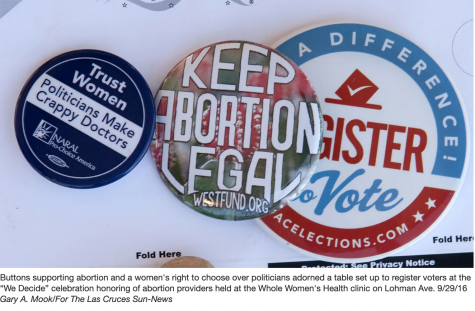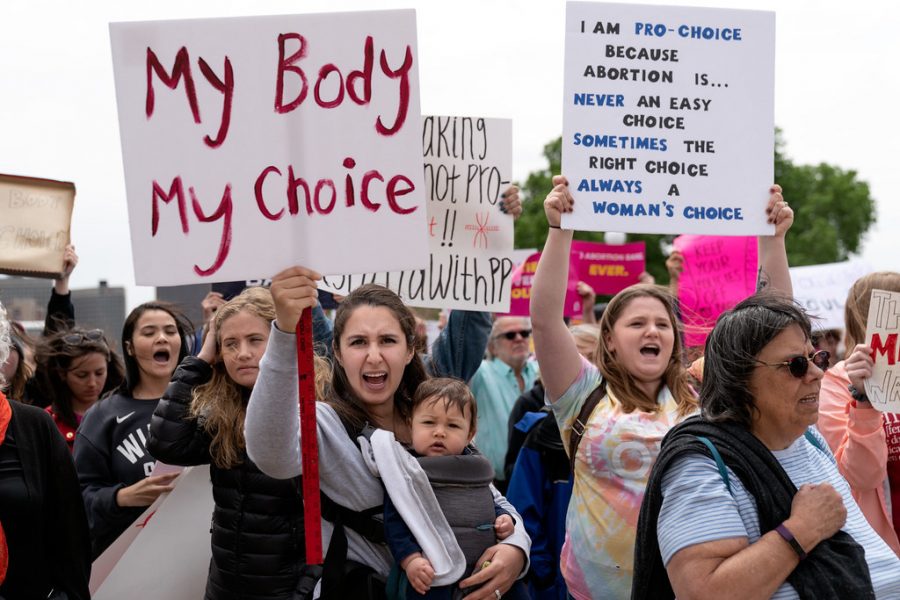Women Should Have Control Over Their Bodies
Lorie Shaull, Creative Commons Attribution-Share Alike 2.0 Generic
Protesters against abortion bans in St. Paul , MN in 2019
In 1973, Roe v. Wade legalized abortion across the country. The final ruling of the case was and still is incredibly controversial, dividing the country into pro-life (anti-abortion), and pro-choice movements, which support a women’s choice and right to her own body. Roe v. Wade gave constitutional protection to a woman’s right to obtain an abortion until 15 weeks of pregnancy, and completely reconstructed women’s rights in modern US society. Because of it, women have had rightful control over their own reproductive choices. The change was monumental but is now at risk due to political scrutiny.
Over the last 100 years, women have fought tirelessly to prevent the government from having control over their bodies, but recent events have begun to challenge that. Texas officials initiated the new almost-complete abortion ban, called the Heartbeat Act, that “allows private citizens to sue abortion providers and anyone else who helps a woman obtain an abortion — including those who give a woman a ride to a clinic or provide financial assistance to obtain an abortion,” according to NPR.
There will be no exceptions to this law for rape or incest, which creates a daunting reality for women whose unplanned pregnancies are a result of uncontrollable, highly traumatic events.

Texas officials have undermined the law that Roe v. Wade set within the federal government. The law states that “any pregnancy in which a heartbeat is detected cannot be aborted,” according to The Washington Post. It grants the right for anyone to sue an associated individual who has in any way, “aided or abetted” with an abortion. Since the law only applies to the singular state, as of now, it is able to stay underground and has still not been officially ruled on by the U.S. Supreme Court. Until the official hearing, the law is able to still control the bodies of women in the state of Texas, despite these actions directly contradicting the ruling of Roe v. Wade.
The article continues, stating “the law sets a $10,000 award (to be paid by the defendant) for any successful lawsuit brought in relation to an abortion.” This ultimately makes the public stop caring about the health and quality of life of a mother and a child, and start caring about greed. As of now, Texas has reduced abortions in the state by 85%.
As an American woman who lives by the laws government officials set into place for me to follow, I find this new law appalling. Other states such as Arizona have taken up these new laws and applied them to the federal ruling in their state.
Given the high number of red states across the country and the fact that strongly Republican states like Texas and Arizona have taken initiative, other states with the same values and beliefs are likely to follow. If abortion becomes even higher-risk, pregnant women and those who assist them in getting an abortion are in trouble.
 This is a human rights crisis. Women all around the country have to face the possibility of losing control over their own bodies. For many, getting an abortion is the only option to ensure a sustainable future for themselves because they are unable to support another life. Whether it is for financial reasons, trauma, or simply age, some women just do not want to have a child.
This is a human rights crisis. Women all around the country have to face the possibility of losing control over their own bodies. For many, getting an abortion is the only option to ensure a sustainable future for themselves because they are unable to support another life. Whether it is for financial reasons, trauma, or simply age, some women just do not want to have a child.
In recent months, especially with the incentive of money, the anti-abortion movement seems to be migrating away from the actual desire to save a life.
Abortion in America’s modern social climate is becoming not really about the process itself. According to a New York Times article, “‘the difference in support for the pro-choice position was a mere six percentage points,’ Alan Abramowitz, a political scientist at Emory University, [stated]. ‘40 percent of Democratic identifiers were pro-life, while 39 percent were pro-choice. Among Republican identifiers, 33 percent were pro-choice, 45 percent were pro-life and 22 percent were in the middle.’” The overall subject of abortion forces individuals to make a choice that divides them from their fellow citizens. Now, a woman’s decision about her own body is fueling a nationwide political fire.
The solution is simple. If the Supreme Court vetoes the law, Roe v. Wade will still apply and the Heartbeat Act will have to reiterate its inhumanitarian process. Women should have control over their bodies in any situation, not the government and especially not Texas lawmakers.

A senior at the Albuquerque Academy, Stella Hudson has been writing for The Advocate since the beginning of her sophomore year. Her work centers mostly...








john • Nov 15, 2021 at 12:30 pm
If you don’t want a child, then don’t have sex.
Ella Payne • Nov 17, 2021 at 2:57 pm
Women should have complete control over their own bodies, including sex. Sex does not have to be about having a child, it can also be for pleasure. Women were not put on this earth to be baby making machines. Having a child should be a choice, having sex should be a choice.
Sara • Nov 17, 2021 at 6:08 pm
I completely agree. Men have choices, right? How come we can’t?
Sara • Nov 17, 2021 at 3:15 pm
In some cases, just like this article says, you can’t control what happens to you. You are raped. They don’t want to be raped. It was never their fault.
xxx • Nov 17, 2021 at 4:47 pm
Women get raped. Men lie to women about using condoms. Even if the sex is consensual, accidents can happen.
George Ovitt • Nov 3, 2021 at 2:43 pm
Well done, thoughtful, and, yes, this Texas law, with its component of vigilantism, is “a human rights threat.” Thanks for this.